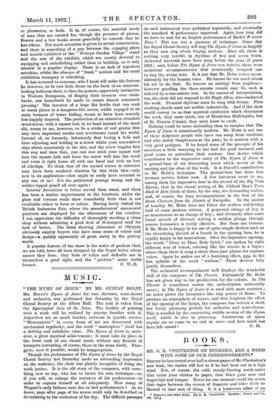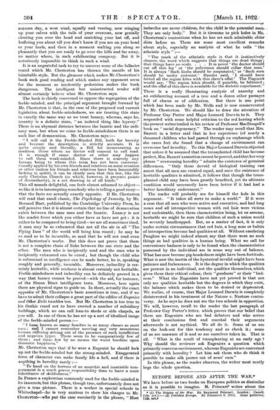BOOKS.
MR. G. K. CHESTERTON ON EUGENICS, AND A WORD WITH SOME OF OUR CORRESPONDENTS.*
BEFORE he has turned over half-a-dozen pages of Mr. Chesterton's new book, the reader will feel as if he had been out in a high wind. Not, of course, the cold, steady-blowing north-easter that turns your clothes to paper, that blues your nose and finger-tips and temper. Never for one moment could the storm that rages between the covers of Eugenics and Other Evils be likened to that sort of thing. It is a boisterous affair of an • Eugenics and Other Evils. By G. E. Chesterton. London : Cassell and Co, (8s. net.]
autumn day, a west wind; squally and veering, now stinging up your calves with the tails of your overcoat, now genially clouting you over the head and snatching your hat off, and buffeting you about till you don't know if you are on your head or your heels, and then in a moment wafting you along so pleasantly that you are ready to go over the hills and far away, no matter where, in such exhilarating company. But it is notoriously impossible to think in such a wind.
It is an ungrateful task to try to uncover some of the fallacies round which Mr. Chesterton has thrown the mantle of his inimitable style. But the glamour which makes Mr. Chesterton's book such good reading and which makes any opponent seem for the moment so intolerably pedestrian makes the book dangerous. The intelligent but uninstructed reader will almost certainly believe what Mr. Chesterton says.
The book is chiefly concerned to oppose the segregation of the feeble-minded, and the principal argument brought forward by Mr. Chesterton is that, in the case of the proposed and current legislation about feeble-mindedness, we are treating this state in exactly the same way as we treat lunacy, whereas, says he, insanity is a definite state, "an isolated thing like leprosy." There is an abysmal distance between the lunatic and the ordi- nary man, but when we come to feeble-mindedness there is no such line of demarcation. Mr. Chesterton says :—
"I will call it the Feeble-Minded Bill, both for brevity and because the description is strictly accurate. It is quite simply and literally, a Bill for incarcerating as madmen those whom no doctor will consent to call mad. It is enough if some doctor or other may happen to call them weak-minded. Since there is scarcely any human being to whom this term has not been conversa- tionally appliod by his own friends and relatives on some occasion or other (unless his friends and relatives have been lamentably Jacking in spirit), it can be clearly seen that this law, like the early Christian Church (to which, however, it presents points of dissimilarity), is a net drawing in of all kinds."
This all sounds delightful, one feels almost ashamed to object— so like it is to interrupting somebody who is telling a good story— that the facts are actually exactly opposite. If Mr. Chesterton will read that small classic, The Psychology of Insanity, by Mr. Bernard Hart, published by the Cambridge University Press, he will perceive that it is almost certain that no line of demarcation exists between the sane man and the lunatic. Lunacy is not like scarlet fever which you either have or have not got : it is rather to be compared to being tired—we are all sometimes tired. A man may be so exhausted that not all the ale in all "The Flying Inns" of the world will bring him round ; he may be go mad as to be incurable, so mad that he will not read even Mr. Chesterton's works. But this does not prove that there is not a complete chain of links between the one state and the other. The man who is incipiently mad and the man who is incipiently exhausted can be cured ; but though the child who is subnormal in intelligence can be made better, he is, speaking roughly and generally, incurable. Moreover, imbecility is cer- tainly heritable, while madness is almost certainly not heritable. Feeble-niindedness and imbecility can be definitely proved in a way that lunacy cannot be proved—with the aid, for instance, of the Simon Binet intelligence tests. Moreover, here again there are physical signs to guideus. In short, actually the exact opposite of Mr. Chesterton's basic assertions is true, and if we have to admit their collapse a great part of the edifice of Eugenics and Other Evils tumbles too. But Mr. Chesterton is too trite to his Gothic creed not to have erected a number of subsidiary buildings, which we can call lean-to sheds or side chapels, as you will. In one of them he has set up a sort of idealized image of the feeble-minded person :— " I have known as many families in as many classes as most Inca; and I cannot remember meeting any very monstrous human stffiering arising out of the presence of such insufficient and negative types. There seem to be comparatively few of them ; and thew few by no means the worst burdens upon domestic happiness."
Mr. Chesterton says that if he were a Eugenist he should lock up not the feeble-minded but the strong-minded. Exaggerated force of character can make family life a hell, and if there is anything in heredity surely :—
"To hand on the horrors of an anarchic and insatiable tem- perament Is a much graver responsibility than to leave a mere inheritance of childishness."
In France a euphemism commonly used for the feeble-minded is lee innocenta, but this phrase, though true, unfortunately does not give a true picture. There is a worker in special schools in Whitechapel—he is very anxious to show his charges to Mr. Chesterton—who put the case succinctly in the phreee, " Most
imbeciles are never children; for the child is the potential meal. They are only body." . But it is tiresome to pick holes in Mr,. Chesterton's contentions when he has set such admirable °biter dicta before us. There are some most excellent remarks about. style, especially an analysis of what he calls "the. atheistic style" :— " The mark of the atheietic style is that it instinctively chooses the word which suggests that things are dead things ; that things have no Souls. . . . It is never the doctor should cut off this leg' or the policeman should collar that man.' It is always Such limbs should be amputated,' or Such men should be under restraint.' Hamlet said, 'I should have fatted all the region kites with this slave's offal.' The Eugenie; would say, The region kites should, if possible, be fattened ; and the offal of this slave is available for the dietetic experiment."
There is a really illuminating analysis of anarchy and an exhilarating account of a tree and a dozen other passages full of charm or of edification. But there is one point which has been made by Mr. Wells and is now reasiseverated by Mr. Chesterton. We should like to draw the attention of Professor Guy - Porter and Major Leonard Darwin to it. They responded with some helpful criticism to the red herring which thepresent writer trailed in his review of Professor- MacDougall's book on "racial degeneracy." The -reader ;nay recall that Mrs.
Barrett in a letter said that in her experience (of nearly a thousand children who had passed through an orphanage which she cares for) she found that a change of environment can overcome bad heredity. To this Major Leonard Darwin objected that unless it be assumed that the transplanted child has become perfect, Mrs. Barrett's assertion cannot be proved, and that her very phrase "overcoming heredity" admits the existence of germinal differences. "Only those devoid of biological training' can assert that all men are created equal, and once the existence of heritable qualities is admitted, it follows that though the trans- planted child may have been greatly benefited, yet its ultimate condition would necessarily have been better if it had had a better hereditary endowment."
The reader will probably see for himself the hole in this
argument. "It takes all sorts to make a world." If it were a case that all men who were active and executive, and had long noses and all introspective women with red hair were vicious and undesirable, then these characteristics being, let us assume,
heritable we might be sure that children of such a union would be severely handicapped. But, as a matter of fact, it is only under certain circumstances that red hair, a long nose or habits of introspection become bad qualities at all. Without emulating Pangloss we might indeed almost say that there were no such things as bad qualities in a human being. What we call for convenience badness is only to be found when the characteristics possessed by the individual are in some way out of balance. What has now become pig-headedness might have been fortitude.
What is now the inertia of the hysterical invalid might have been patience and forbearance. It is the degree in which the qualities are present in an individual, not the qualities themselves, which gives them their ethical. colour, their "goodness" or their "bad-
ness." What the Eugenists have not yet proved is that not only are qualities heritable but the degrees in which they exist, the balance which makes them to be desired or deprecated. We realise, of course, that Major Leonard Darwin is completely disinterested in his treatment of the Nature v. Nurture contro- versy. As he says he does not see the two schools in opposition.
We will, however, recall to the reader the last paragraph of Professor Guy Porter's letter, which proves that our belief that there are Eugenists who are bad debaters and who arrive at their conclusions first and marshal their arguments afterwards is not mythical. We all do it. Some of us are on the look-out for this tendency and so check it ; some of us are unaware of it and so are ourselves taken in. That is "What is the result of transplanting at an early age ?
Why should the reviewer ask Eugenists a question which primarily concerns environment, whereas Eugenists are concerned primarily with heredity ? Let him ask those who do think it possible to make silk purses out of sows' ears."
In this phrase, as the reader observes, the writer most neatly begs the whole question.



































 Previous page
Previous page